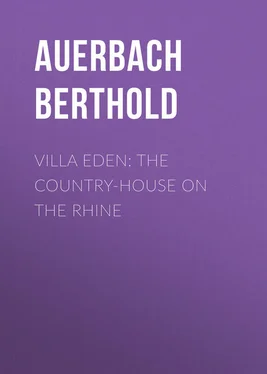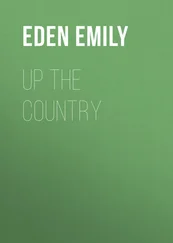Berthold Auerbach - Villa Eden - The Country-House on the Rhine
Здесь есть возможность читать онлайн «Berthold Auerbach - Villa Eden - The Country-House on the Rhine» — ознакомительный отрывок электронной книги совершенно бесплатно, а после прочтения отрывка купить полную версию. В некоторых случаях можно слушать аудио, скачать через торрент в формате fb2 и присутствует краткое содержание. Жанр: foreign_antique, foreign_prose, Историческая проза, на английском языке. Описание произведения, (предисловие) а так же отзывы посетителей доступны на портале библиотеки ЛибКат.
- Название:Villa Eden: The Country-House on the Rhine
- Автор:
- Жанр:
- Год:неизвестен
- ISBN:нет данных
- Рейтинг книги:4 / 5. Голосов: 1
-
Избранное:Добавить в избранное
- Отзывы:
-
Ваша оценка:
- 80
- 1
- 2
- 3
- 4
- 5
Villa Eden: The Country-House on the Rhine: краткое содержание, описание и аннотация
Предлагаем к чтению аннотацию, описание, краткое содержание или предисловие (зависит от того, что написал сам автор книги «Villa Eden: The Country-House on the Rhine»). Если вы не нашли необходимую информацию о книге — напишите в комментариях, мы постараемся отыскать её.
Villa Eden: The Country-House on the Rhine — читать онлайн ознакомительный отрывок
Ниже представлен текст книги, разбитый по страницам. Система сохранения места последней прочитанной страницы, позволяет с удобством читать онлайн бесплатно книгу «Villa Eden: The Country-House on the Rhine», без необходимости каждый раз заново искать на чём Вы остановились. Поставьте закладку, и сможете в любой момент перейти на страницу, на которой закончили чтение.
Интервал:
Закладка:
Eric was often spoken to, but he held himself aloof from all companionship, wishing in the movement around him to be alone with the delightful landscape. There are words which become poles of thought in the meditation of the lonely. Eric heard one fellow traveller say to another,
"I prefer to go up the river, for one can look at everything longer and more closely, and it is a triumph of the human mind that we can make headway against the current."
Against the current! That was the word which that day stuck fast to Eric out of the thousand things he thought of and looked upon. Against the stream! That was also his life-course. He had left the trodden highway, and with bold self-determination he had marked out a path of his own. It is well, for one there learns more perfectly the world about him, and, above all, learns his own strength.
"Against the current!" said he, smiling to himself. "Let us see what will come of it." It was high noon when he disembarked at a little mediæval city.
A young man standing on the shore looked sharply at him, exclaiming, "Dournay!" "Herr von Pranken!" answered Eric. They grasped each other's hands.
CHAPTER III.
DRINKING NEW WINE
"Before people have fairly done shaking hands, they say, 'Let us drink.' It must be the river there that makes you long so to quench your thirst."
So spoke Eric to the tall, fair youth of his own age, sitting opposite, who had placed his nicely gloved hand upon a brown spaniel whose head lay in his lap. The dog frequently looked up to Eric, whose deep, musical voice perhaps produced an impression upon the creature.
"Here is the list of wines. What year and what vintage do you prefer? Shall we take new wine, still lively and fermenting?" "Yes, new wine, and from the mountain here upon which the sun lies so cheerily, and where the cuckoo calls from the wood; – wine native to the soil, and blood-relation of this beautiful region."
Pranken in sharp, military accent gave the order to the waiter, – "A bottle of Anslese." The wine came, and was poured out golden into the sparkling glasses; the two men touched glasses and drank. They sat among the vines by the shore, where the refreshing landscape stretched itself out over green islands in the river, over gleaming habitations, over vineyards and mountains.
The boats by the shore were still, for the swell made by the steamboat had subsided; here and there the distant rumbling of a railway train was heard; on the smooth stream, in which the white clouds of heaven mirrored themselves, beams of the noonday sun sparkled, and in the foliage of the blossoming elder the nightingale sang.
"This is life!" said Eric, extending his arms. "After a day of loneliness amidst the confused whirl of thoughts and of people, to meet thus unexpectedly an old acquaintance is indeed like home; and let me tell you, moreover, that I look upon this meeting as a good omen."
Otto von Pranken nodded acquiescingly. In the first surprise, he had, perhaps, given Eric a warmer welcome than their acquaintance warranted; but now that Eric made no assumption of intimacy he nodded, well pleased. Eric has the tact to know his place; it's well. Pranken immediately drew off his glove, and reaching out his hand to Eric, asked, "Are you taking a pleasure-tour?"
"No, I am not in the situation, nor would this be the fitting time to do so. You probably do not know that my father died two months ago." "Indeed, indeed! and I shall be forever grateful to our good Professor; the little that I learned at the military school – and it is little enough – I owe altogether to him. Ah! what patience and what unremitting zeal your good father had! Let us pledge his memory." Their glasses clinked. "When I am dead,'" said Eric, and his voice had a tone of deep emotion, "I should like that my son should thus with a companion pledge my memory in the bright noonday."
"Ah! to die!" Pranken wished to turn the subject. "If I must die, that's enough, without knowing what is said of me afterwards. It is in a high degree offensive to me, that they have placed their burying ground in the midst of the vineyard yonder."
Eric made no reply, looking with fixed gaze before him, and listening to the cuckoo's voice calling at that moment from the churchyard. "Are you an agriculturist?" he asked, as if summoning together his scattered thoughts. "A sort of one; I have taken off, I don't know for how long it will be, my lieutenant's uniform, and mounted the high jack-boots; but I am bored by the one as much as by the other." He took his nail-cleaner out of his pocket, and worked away industriously at his nails; then with his pocket-brush he smoothed down again his carefully parted but thin hair, occasionally looking up to his companion opposite.
The two, sitting there for a little while without speaking, sharply inspected each other. Two awkward people, who are placed in a position of helpless antagonism, become mutually embarrassed; two clever people, who know each other's cleverness, are like two fencers, who, familiar with each other's ward and pass, will not risk a stroke or thrust. Pranken bent over his glass, inhaled the bouquet of the wine, and said, at length, half smiling, "Perhaps you will now abandon your late Communistic views."
"Communistic! I had no idea that you, like so many others, cover up everything unpleasant with that convenient formula of excommunication, 'Communism.' I should like to be a Communist. I mean that I should like to see in Communism a form of organization adapted to the wants of society, which it is not, and never can be. We must take some other method than this, to get rid of the existing barbarism which compels our fellow human beings to be without the most common necessities of life. It is a bitter drop in my glass, that, while I can here at leisure drink this mountain-wine, yonder are poor hard-driven laborers who can never taste of it."
"To-day is a holiday, and no one labors then," said Pranken, with a laugh. Already, in this first meeting, the contrast of these two young men was plainly to be seen. Eric also laughed at this unexpected turn from his comrade; but he was mature enough not to make a personal matter out of a difference of theory. He therefore came back to neutral ground, and the conversation flowed on quietly in recollections of the past, and thoughts of the future.
In their carriage and gait, the military training of the two young men was plainly to be seen; but in Eric the stiffness was tempered by a sort of artistic grace. Pranken was elegant, Eric noble and refined; every tone and movement of Pranken bespoke attention; but his demeanor had that cool insolence, or – if that is too harsh a word – impertinence, which regards every one outside of one's circle as non-existent, or at least as having no right to exist.
Eric had an equally good figure, but he was more easy and dignified. Eric's voice was a fine, deep baritone, while Pranken's was a tenor. Their different characters could be seen also in their way of speaking. Eric pronounced every word and letter distinctly; Pranken, on the other hand, spoke with a lazy drawl, as if the vowels and consonants were too much for him, and as if he must avoid all straining of the organs of speech; the words dropped, as it were, out of his lips, and yet he liked to talk, and made excellent points. Pranken's remarks were forcible, and came out in jets, like the short canter peculiar to the Royal bodyguard. When talking upon the most ordinary occurrence, his manner was somewhat rattling and noisy, like one handling his shoulder-belt, and joining or leaving a convivial company. Eric had thought more than he had talked. A secluded student in the almost cloister-like retirement of home, this bearing was wholly novel and strange to him.
"Herr Baron," said the waiter, as he brought in a bottle of native, sparkling wine, "your coachman wishes to know if he shall unharness the horses."
Читать дальшеИнтервал:
Закладка:
Похожие книги на «Villa Eden: The Country-House on the Rhine»
Представляем Вашему вниманию похожие книги на «Villa Eden: The Country-House on the Rhine» списком для выбора. Мы отобрали схожую по названию и смыслу литературу в надежде предоставить читателям больше вариантов отыскать новые, интересные, ещё непрочитанные произведения.
Обсуждение, отзывы о книге «Villa Eden: The Country-House on the Rhine» и просто собственные мнения читателей. Оставьте ваши комментарии, напишите, что Вы думаете о произведении, его смысле или главных героях. Укажите что конкретно понравилось, а что нет, и почему Вы так считаете.












